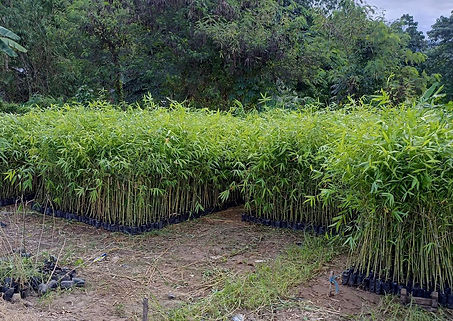Recent Articles
Building a Sustainable Future with Nature's Finest Materials
Building a Sustainable Future with Nature's Finest
Discover ethically sourced bamboo, abaca fiber, and coconut-based activated carbon for your sustainable solutions.
Welcome to La Liga Laurel Group (LLLG), also known as La Liga Laurel Business Development Corp. We are dedicated to providing premium, ethically sourced, and sustainable materials to meet the growing global demand for environmentally responsible alternatives. Our commitment lies in harnessing the power of nature to offer high-performance solutions for a variety of industries.
Ready to explore how our sustainable materials can benefit your projects? Browse our website to learn more about our products and services.
Sustainable Solutions Tailored to Your Needs
Sustainable Building Materials:
While we offer our materials in raw or raw but treated form, we are currently working on the development of finished sustainable industrial building materials including engineered bamboo panels made from giant bamboo, abaca fiber-reinforced composites for structural applications, and potentially coconut fiberboard. These materials provide durable and eco-friendly alternatives to conventional building resources.
Eco-Friendly Insulation:
Our abaca fiber insulation offers a sustainable and effective alternative to traditional insulation materials like polystyrene and polyurethane. Abaca's natural properties provide excellent thermal conductivity.
Activated Carbon Solutions:
We provide high-quality coconut-based activated carbon in various grades and forms (granular, powdered, pelletized) for a wide range of applications. Our activated carbon is ideal for water and air purification systems, as well as industrial processes requiring effective adsorption.
Custom Material Development:
Depending on your specific requirements, we can also develop custom materials for your project.
Our Materials

Tinik Bamboo
Properties:
Kawayan Tinik (aka Bambusa blumeana) is highly regarded in the Philippines for its high specific gravity and minimal shrinkage upon drying, making it ideal for construction. Its thorny branches provide natural protection, and it's known for its resilience. This species is also effective in land rehabilitation and erosion prevention.
Applications:
Tinik bamboo is traditionally used for construction, furniture making, and handicrafts. Modern applications include its use in cement bamboo frame technology for social housing and as a raw material for engineered bamboo products like parquets and laminated items. Young shoots are also a valued food source.
Sustainability:
Tinik bamboo is a rapidly renewable resource with a short maturity cycle. Its cultivation supports land regeneration and helps prevent soil erosion. Bamboo forests, including Tinik varieties, absorb significant amounts of carbon dioxide.

Coconut-Based Activated Carbon
Introduction:
Activated carbon derived from coconut shells is a highly effective adsorbent material with a wide range of applications. Produced from a renewable resource, it offers a sustainable solution for purification and filtration needs.
Properties:
Coconut shell activated carbon has a highly porous structure with a large surface area, providing excellent adsorption capacity. It is known for its high hardness, purity, and low dust content.
Applications:
This material is widely used in water purification to remove impurities, odors, and colors. It is also effective in air filtration for removing pollutants and odors. Other applications include gold recovery in mining, removal of organic impurities in the food and beverage industry, and medical uses like blood filtering. It can also be used as a catalyst support.
Sustainability:
Utilizing coconut shells, often considered agricultural waste, to produce activated carbon promotes a circular economy and reduces environmental impact. Coconut trees are drought-tolerant and can grow in challenging coastal environments.

Abaca Fiber
Introduction:
Abaca (Musa textilis), also known as Manila hemp, is a natural leaf fiber renowned for its exceptional strength, durability, and resistance to saltwater damage. Native to the Philippines, abaca is recognized as a sustainable and environmentally friendly resource.
Properties:
Abaca fibers possess high tensile strength and stiffness due to its rich cellulose content. Its long fiber length (often exceeding 3 meters) and resistance to saltwater make them suitable for demanding applications. Chemical treatments can further enhance their properties.
Applications:
Abaca fiber is increasingly used as a reinforcement in composite materials for automotive and construction industries. It shows promise as a sustainable cellulose fiber insulation material. Traditionally, abaca has been used for strong ropes, twines, nets, and durable textiles, particularly in maritime applications. It is also a valuable material in the paper industry for specialty papers requiring high strength.
Sustainability:
Abaca is a biodegradable and renewable fiber that requires minimal or no pesticides for cultivation, making it a sustainable choice. Its cultivation can aid in erosion control and biodiversity rehabilitation, especially when intercropped with coconut palms. Abaca waste can also be used as organic fertilizer.

Our Sustainability Commitment

Ethical Sourcing Principles:
La Liga Laurel Group is committed to the highest standards of ethical sourcing. We ensure fair labor practices, safe working conditions, and respect for human rights throughout our supply chain. We actively work with our suppliers to uphold these principles and promote positive social impact in the communities where our materials originate.
Environmental Responsibility:
We are dedicated to minimizing our environmental footprint and promoting sustainable practices. Our chosen materials – bamboo, abaca, and coconut – are inherently sustainable resources with numerous environmental benefits, including carbon sequestration, land regeneration, and reduced reliance on non-renewable resources.


Certifications & Standards:
We recognize the importance of certifications in verifying our sustainability claims. In the Philippines, bamboo, as a non-timber forest product, is regulated by the Department of Environment and Natural Resources (DENR) under PD 705 and Forestry Administrative Order (FAO) 11. We prioritize sourcing only bamboo that has a Certificate of Non-Timber Forest Products Origin (CNFPO) and harvested under NATIONAL GREENING PROGRAM of the government office (DENR).

Community Engagement:
We believe in supporting the communities involved in the cultivation and processing of our materials. Our sourcing practices aim to create economic opportunities and contribute to the well-being of these communities.
La Liga Laurel Group aligns itself with Climate Change Commission (Philippines) and it’s flagship capacity building program, the Communities For Resilience (CORE), the People’s Survival Fund (PSF), and the Comprehensive Integrated Climate Change Adaptation and Resilience Program for the Indigenous Peoples.
.jpg)












